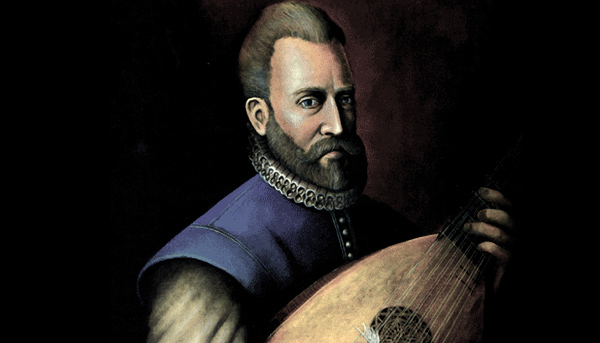
John Dowland was an English composer of the Renaissance period. He is most famous for his melancholic songs and instrumental music.
Due to lack of historical archives, there is very little that is known about Dowland’s early life. Some historians claim that he was born in 1563 somewhere near Dublin, as is claimed by the Irish Historian, Grattan Flood. Another historian, Thomas Fuller, claims that he was born in Westminster; however, no evidence has been found as to where he was born exactly, or as to where he spent his childhood. The accounts of his life begin in the year 1580, when he was sent to Paris to serve the ambassador to the French Court, Sir Henry Cobham. Dowland also served Sir Cobham’s successor, Sir Edward Stafford. After a period of four years, Dowland moved to England to pursue his love interest. It was in 1588 that Dowland was admitted to the Bachelors in Music program at Christ Church, Oxford.
Dowland’s principle instrument was the Lute, a stringed instrument that is sparingly similar to the ukulele of today, only larger. In 1594, Dowland unsuccessfully applied to the lutenist position at the English Court, where he cited his catholic religion as the result of his failed application (as the court Protestant). However, Dowland soon found great success at the court of Denmark’s King Christian IV. The King was so fond of music that his musicians were often the highest paid servants of the court; even so, Dowland continued to publish his music in London, so much so that the King was ultimately annoyed whenever Dowland would take absences for publishing purposes. Thus, Dowland was dismissed in 1606 and in 1612, he started playing in the court of England’s King James I, where he played until his death in 1612.
Most of Dowland’s works are traditional lute songs, and viol consorts with lute accompaniment. He is often cited as the author of the exceptionally famous “First Book of Songs”, which he published in London in 1597. Many critics agree of its place as one of the most important publications in the history of the lute, even though the book allows for improvisation and transcription to other instruments. Dowland went on to publish two further books of songs, one in 1600, and another in 1603. In 1609, he published a translation of Andreas Ornithiparcus’s “Micrologus”, which was originally published in 1517. Many scholars believe that Dowland’s last published work, “A Pilgrimes Solace”, was undoubtedly his best.
Many of Dowland’s songs are renowned for their melancholic value. The song “Come Again, Heavy Sleep” inspired Benjamin Britten’s “Nocturnal”. “Flow my Tears” was known for its poetic lyrics. His instrumental compositions were known for their extraordinary fusion of the lute and the viol. His best known instrumental works, such as “Lachrimae” and “Seven Teares” are excellent examples of such fusion.
Much of Dowland’s current fame is due to the re-discovery of his works by 20th Century Musicians. Frederick Keel, an English composer, set many of Dowland’s works to songs. An Australian Composer, Percy Grainger, also arranged many of Dowland’s works for the piano. Other composers who took an interest in Dowland’s works include Alfred Deller, Julian Bream, Peter Pears and Nigel North.
John Dowland was buried at St Ann’s, Blackfriars, London, on February 20, 1626. His exact date of death remains to be unknown.